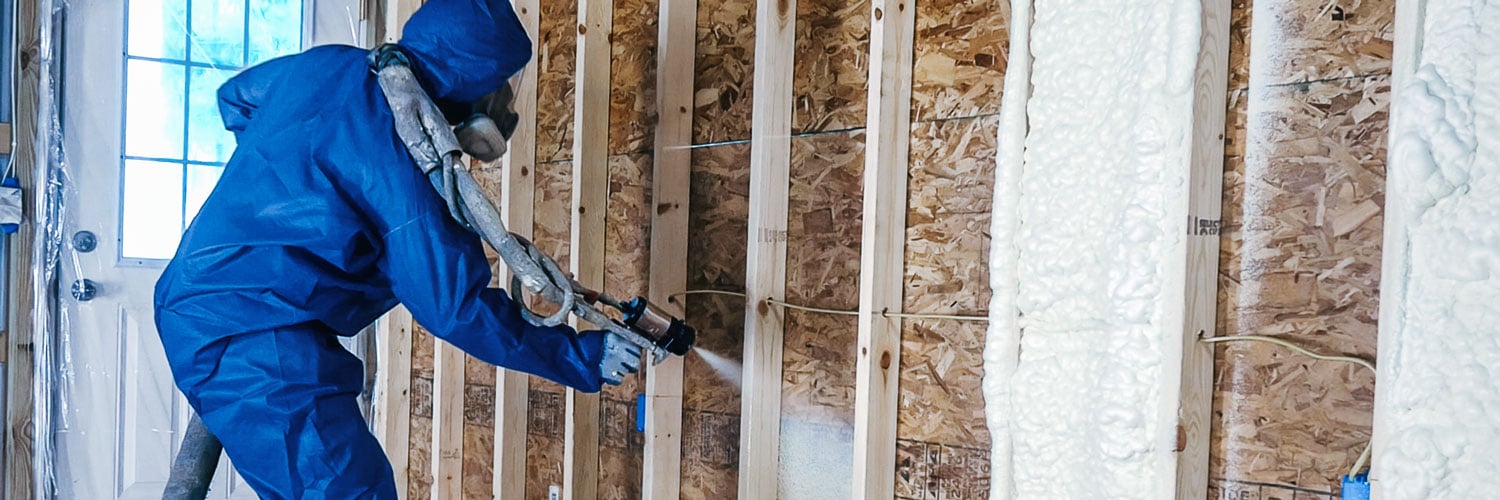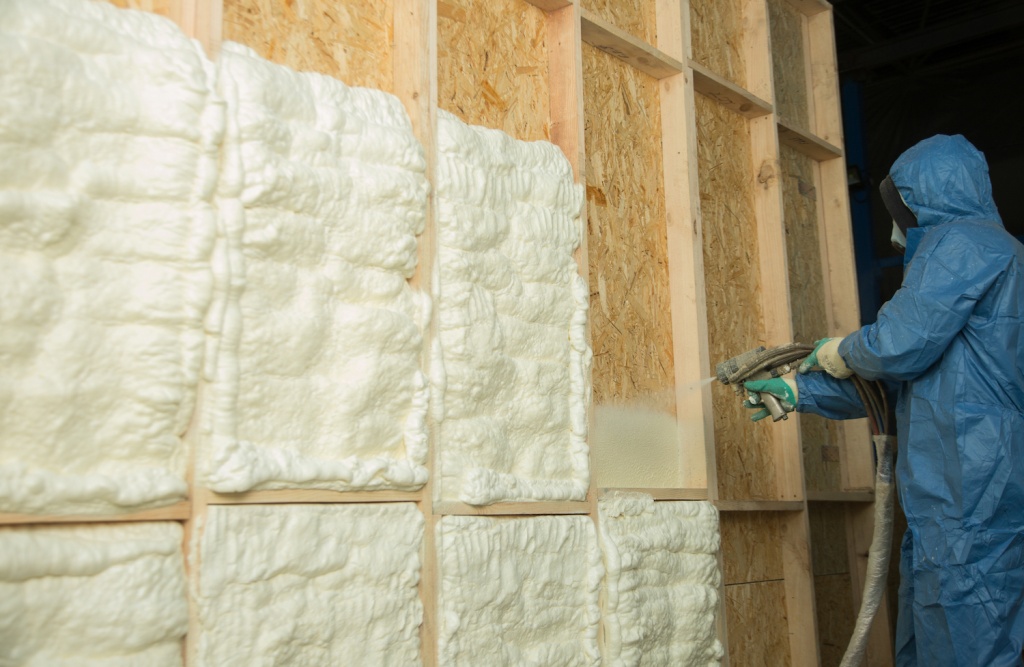Tips for Maintaining Your Spray Foam Insulation for Long-Term Efficiency
Tips for Maintaining Your Spray Foam Insulation for Long-Term Efficiency
Blog Article
Spray Foam: The Ultimate Solution for Air Sealing and Insulation
Spray foam insulation has arised as a leading option for effective air securing and thermal insulation, using an unique mix of residential properties that establish it apart from traditional techniques. Comprehending the full extent of its advantages, installation procedures, and contrasts with various other insulation kinds is essential for making informed decisions.
What Is Spray Foam?
Spray foam is a flexible insulation material that integrates the principles of air securing and thermal resistance to boost energy effectiveness in buildings. Made up mainly of polyurethane or other comparable substances, spray foam is applied as a fluid that expands upon contact with surfaces, producing a solid, constant layer of insulation. This unique home enables it to fill gaps, splits, and spaces that standard insulation products may ignore, giving an exceptional air seal.
There are 2 major sorts of spray foam: open-cell and closed-cell. Open-cell spray foam is lighter and much more flexible, using exceptional noise absorption and a reduced R-value per inch - Spray Foam. On the other hand, closed-cell spray foam is denser, giving a higher R-value, moisture resistance, and added architectural stability to developing parts
The application process commonly involves specialized tools, making certain a smooth application that sticks to different substratums, including steel, concrete, and wood. This adaptability makes spray foam ideal for both brand-new building and constructions and retrofitting existing frameworks. Its capability to produce a closed barrier substantially contributes to decreasing energy consumption and improving interior air top quality, thereby making it a preferred selection among home builders and house owners alike.
Advantages of Spray Foam Insulation
One of one of the most significant advantages of spray foam insulation is its remarkable capability to create a continual air barrier, which efficiently reduces energy loss. Unlike standard insulation products, spray foam increases to load gaps and fractures, guaranteeing that air leak is substantially reduced. This characteristic not only improves power efficiency yet likewise leads to lower utility bills gradually.
In addition, spray foam insulation supplies superior thermal resistance, adding to an extra secure indoor environment. Its high R-value per inch permits effective insulation in constrained rooms, making it perfect for attics, wall surfaces, and crawl areas. The moisture-resistant buildings of spray foam assistance stop mold and mildew and mildew growth, promoting much healthier living problems.
One more critical advantage of spray foam insulation is its sound-dampening top qualities (Spray Foam). It effectively lowers sound transmission between rooms, producing a quieter and more comfy home setting. The durability of spray foam also attracts attention, as it does not sag or clear up gradually, keeping its efficiency throughout its lifespan
Just How Spray Foam Works
Recognizing just how spray foam insulation works is necessary for valuing its performance in air sealing and thermal resistance. Spray foam insulation includes 2 main elements: isocyanate and polyol material. When these parts are mixed, they go through a chemical response that causes the product to increase swiftly, producing a thick foam that fills up tooth cavities, spaces, and cracks.
As the foam expands, it abides by surface areas, developing an impermeable seal that substantially minimizes air infiltration. This particular makes spray foam insulation highly effective at stopping drafts and dampness penetration, which can result in power loss and damage gradually. Furthermore, the closed-cell read version of spray foam uses remarkable thermal resistance because of its stiff framework, efficiently lessening warmth transfer.
The one-of-a-kind residential or commercial properties of spray foam allow it to adapt uneven surfaces, making sure thorough protection and a seamless obstacle. Consequently, spray foam insulation not only improves power effectiveness however additionally adds to boosted indoor air quality by lowering the accumulation of allergens and contaminants. Inevitably, recognizing the mechanics behind spray foam highlights its duty as a superior selection for insulation and air securing in both domestic and commercial applications.
Setup Refine Overview

Before installment, the area needs to be properly cleaned and prepped, guaranteeing that surface areas are devoid of debris, dirt, and wetness. Because pollutants can jeopardize adhesion and overall efficiency, this action is important. When the location is prepared, the application entails mixing both elements of the spray foam, which expands upon call and fills spaces effectively.
Educated specialists must perform why not check here the installation, utilizing customized devices to ensure uniform coverage and optimal density. Security safety measures, consisting of using protective gear and ensuring proper air flow, are imperative during this procedure. After application, the foam commonly treatments swiftly, developing a strong barrier that boosts energy effectiveness.
Comparing Spray Foam to Traditional Insulation
When reviewing insulation options, spray foam insulation sticks out in contrast to conventional products such as fiberglass and cellulose. Among the primary advantages of spray foam is its superior air sealing abilities. Unlike fiberglass and cellulose, which can permit air infiltration, spray foam increases upon application, filling spaces and crevices to develop an impermeable seal. This leads to enhanced energy performance, as much less warmed or cooled down air leaves the home, bring about reduced utility costs.
Additionally, spray foam supplies a higher R-value per inch than traditional insulation types, using more reliable thermal resistance in a thinner profile. This particular is especially useful precede with minimal tooth cavity depth. Additionally, spray foam is resistant to wetness and mold and mildew growth, which can be a substantial interest in cellulose and fiberglass, especially in humid settings.
Nevertheless, spray foam insulation typically brings a higher upfront price than its traditional counterparts. House owners must weigh this initial financial investment against long-lasting energy cost savings and efficiency benefits. Ultimately, while both insulation types serve their objective, spray foam becomes a much more advanced option for modern-day insulation needs, particularly in terms of air securing and thermal effectiveness.

Conclusion
In recap, spray foam insulation stands for a highly efficient solution for attaining optimum air sealing and thermal resistance. Its one-of-a-kind homes, consisting of moisture resistance and sound dampening, make it appropriate for numerous applications in both brand-new buildings and retrofitting tasks (Spray Foam). The initial expenses might be higher compared to traditional insulation products, the long-term advantages, such as significant energy savings and enhanced interior air high quality, warrant the financial investment and underscore its worth in modern-day building practices.
Spray foam insulation has actually emerged as a leading solution for effective air sealing and thermal insulation, supplying an unique combination of properties that establish it apart from typical approaches.Spray foam is a functional insulation product that integrates the principles of air sealing and thermal resistance to improve power performance in buildings.When assessing insulation options, spray foam insulation stands out in contrast to traditional materials such as fiberglass and cellulose. Eventually, while find out both insulation kinds serve their purpose, spray foam arises as an extra advanced service for contemporary insulation demands, especially in terms of air sealing and thermal performance.
In summary, spray foam insulation represents a very effective solution for accomplishing ideal air sealing and thermal resistance.
Report this page